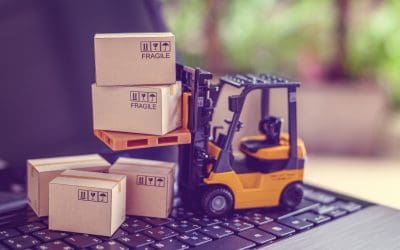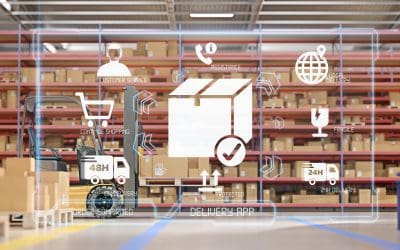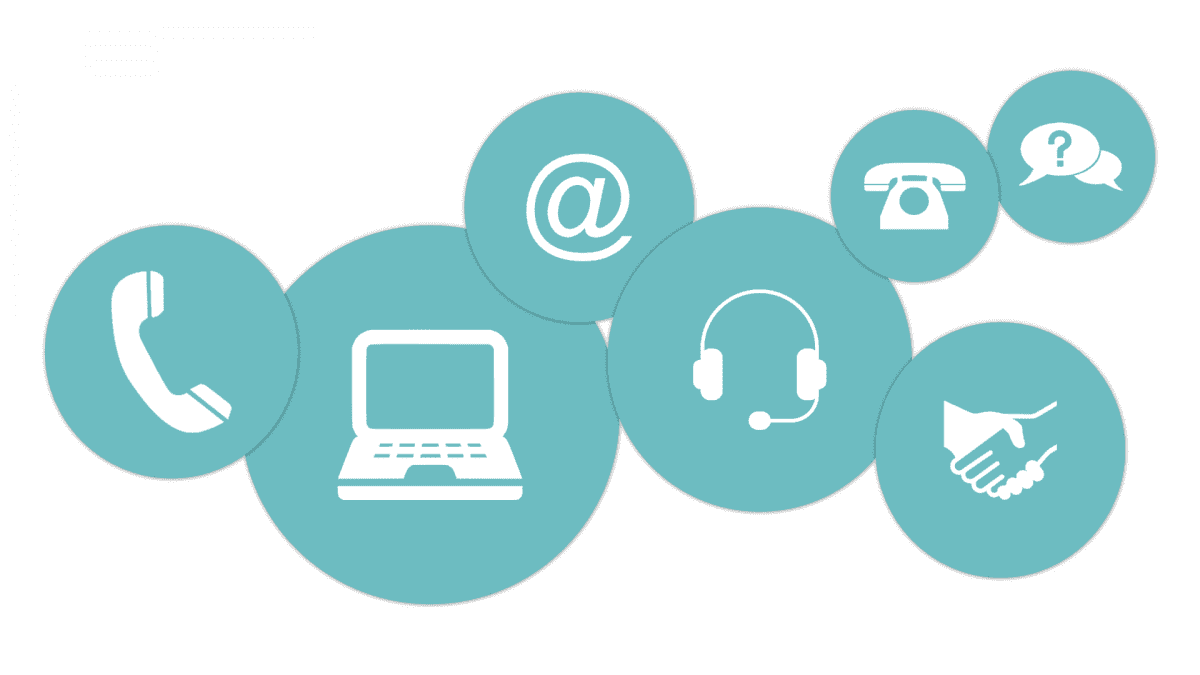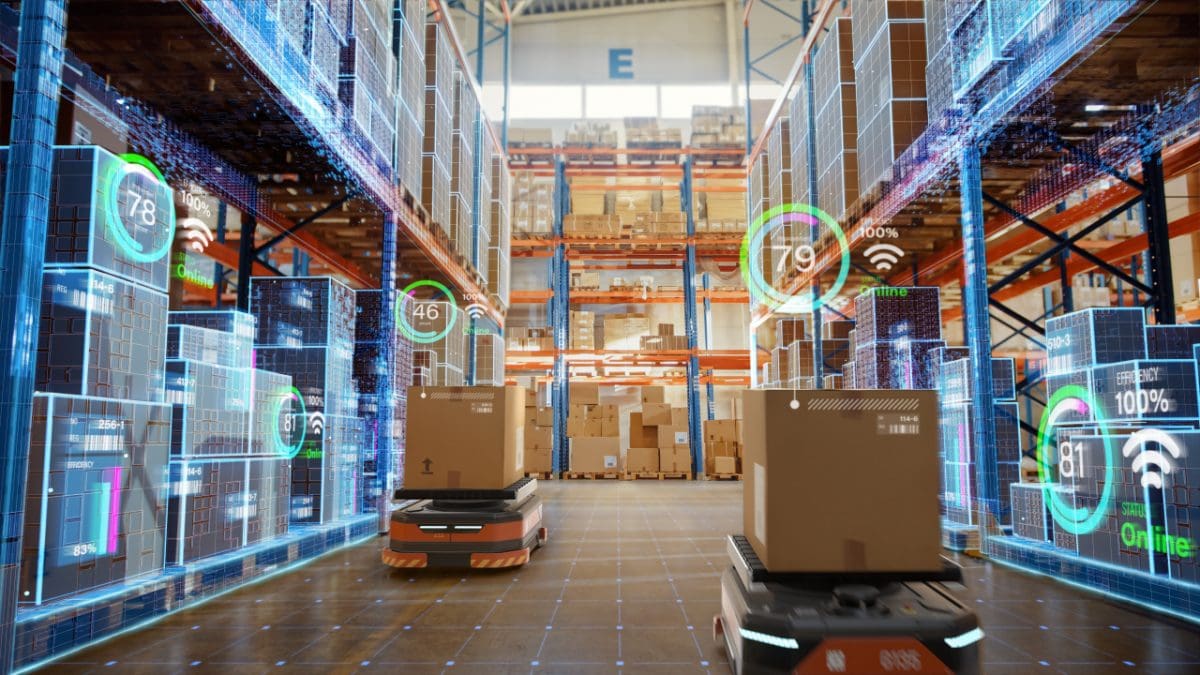
Artificial Intelligence (AI) is revolutionizing the logistics industry by using its data processing capabilities, pattern recognition, and decision-making prowess. AI in logistics holds tremendous potential to revolutionize supply chain management by driving efficiency and cost savings. With optimized fleet management, enhanced supply chain visibility, and the power of predictive analytics, AI brings a host of benefits that can transform the logistics landscape.
- Optimized Fleet Management: Real-time monitoring of vehicles and assets, powered by AI and Internet of Things (IoT) technologies, enables logistics companies to optimize fleet management. By efficiently planning routes, minimizing idle time, reducing fuel consumption, and predicting maintenance needs, AI helps streamline operations, cut costs, and enhance overall efficiency.
- Enhanced Visibility: AI and IoT offer real-time insights into inventory, shipments, and environmental conditions, improving supply chain visibility.
- Predictive Analytics: AI and IoT enable predictive analytics for demand forecasting, optimizing inventory levels, and aligning operations with customer needs.
- Driverless Cars: AI and IoT contribute to driverless vehicles, revolutionizing logistics with cost savings, road safety, and automation of truck fleets.
- Intelligent Route Planning: AI algorithms and real-time IoT data enable intelligent route planning, reducing fuel consumption and travel time for on-time deliveries.
- Smart Warehouse Management: AI and IoT provide real-time data on inventory, storage, and order fulfillment, optimizing operations and increasing efficiency.
Incorporating AI in logistics leads to significant benefits, including cost savings, improved inventory levels, and enhanced service levels. AI-driven demand forecasting reduces errors and optimizes vehicle dispatch, reducing costs and stockouts.
Pioneering AI in Logistics: A Decade of Automated Routing and Dispatch
The transportation and logistics industry has been using AI for over a decade, recognizing its ability and potential to optimize operations. Logistics software has led the way in adopting AI through automated routing and dispatch capabilities.
Logistics companies understood how time-consuming and inefficient manual planning processes were back in the 2010s. This led to the development of AI-powered solutions that could automate and streamline critical tasks. Automated routing and dispatch systems emerged as successful solutions, using machine learning algorithms and historical data to optimize routes and make real-time decisions.
These AI-powered systems have evolved and improved over the years, incorporating advancements like IoT sensors and real-time data feeds. They can now use vast amounts of data, including live traffic updates and weather conditions, to make intelligent routing decisions. The algorithms have also become far more sophisticated, learning from past experiences and adjusting strategies accordingly.
By optimizing routes and automating how resources are used, logistics companies have achieved significant cost savings and improved delivery times. The early adoption of AI in logistics has given these companies a head start in using its benefits. As AI continues to advance, the industry is well-positioned to embrace further advancements and capitalize on increased efficiency and cutting costs.

Top 5 Uses of AI in Logistics
1. Route Optimization
Route optimization stands as a prominent and highly valuable application of AI in the logistics industry. Through the use of AI algorithms and real-time data like traffic conditions, weather forecasts, and delivery constraints, logistics companies can pinpoint the most efficient routes for their vehicles. This optimization process results in shorter travel time, lower fuel consumption, and improved delivery schedules. The benefits are clear: delivers take less time and cost less resulting in happy customers.
2. Demand Forecasting and Inventory Management
AI-powered demand forecasting is a game-changer for logistics companies. By harnessing historical data, market trends, and customer behavior, AI accurately predicts future demand. It’s an invaluable insight allowing logistics companies to easily manage inventory levels, avoid stockouts, and better meet their customer needs. AI-powered demand forecasting is a powerful tool for logistics companies looking to stay ahead of the curve and deliver exceptional service while minimizing costs.
3. Smart Warehouse Management
AI and IoT technologies play a crucial role in enabling smart warehouse management systems. By providing real-time data on inventory levels, storage conditions, and order fulfillment status, these technologies give logistics companies everything they need to make informed decisions. AI algorithms automate inventory tracking, quickly identifying errors or discrepancies. Order picking and fulfillment process are streamlined and improved. There are fewer errors, better accuracy, and increased customer satisfaction because orders are accurate and shipped on or before the date promised.
4. Returns Automation
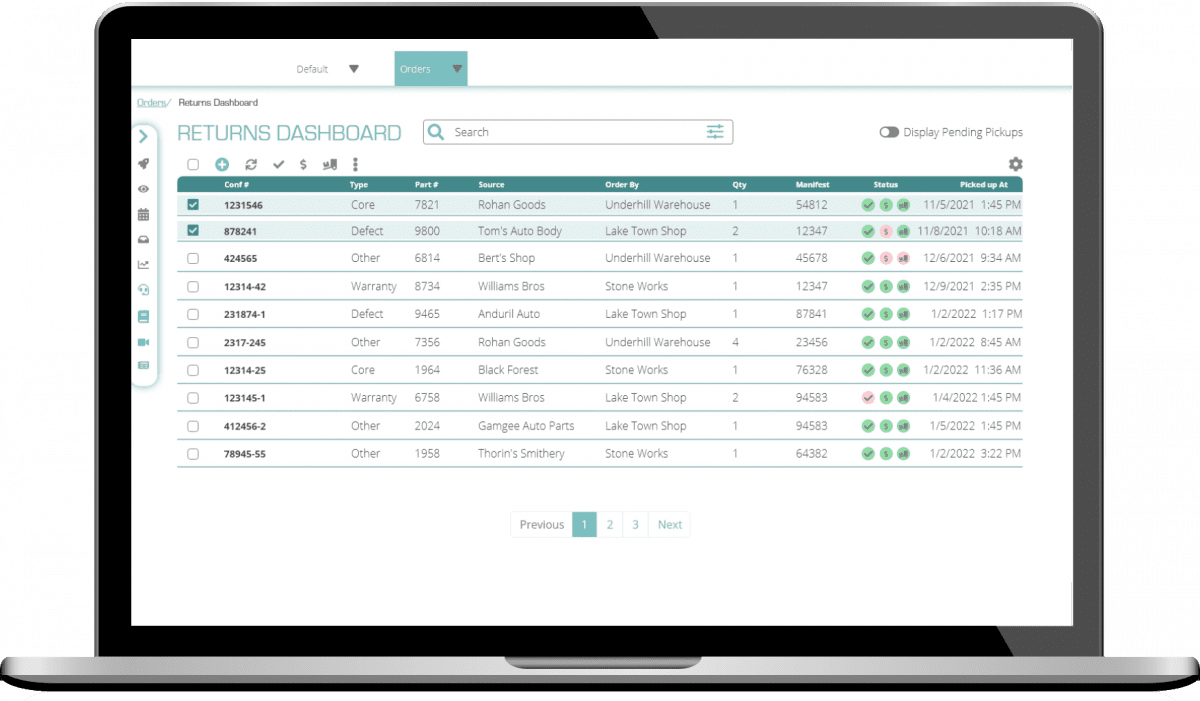
How returns are managed is a vital part of logistics, and AI is improving this process too. With AI-powered returns automation systems, the evaluation and processing of returned products are automated, resulting in faster and more accurate assessments. There’s less need for manual effort for an improved return handling process. Two big benefits here are improved customer experience and reduced costs associated with returns. AI-powered returns automation helps logistics companies manage their inventory more efficiently to monitor stock levels and reduce waste. Elite EXTRA’s Returns Automation, for example, takes the hassle out of managing product returns. Our robust returns management software helps streamline the entire process and makes it a breeze for both companies and their customers.
5. Predictive Maintenance
AI analytics also analyze sensor data from vehicles and equipment in the logistics industry. By detecting patterns and identifying potential equipment problems in advance, AI aids logistics companies in implementing predictive maintenance systems. This proactive approach allows for scheduled maintenance tasks, reducing downtime and preventing costly equipment failures. Fleet performance is improved with fewer disruptions to operations for great potential savings.
While route optimization is a standout application of AI in logistics, it’s important to recognize that other areas are also important in improving efficiency, saving money, and serving customers better.
AI-Driven Route Planning and Optimization: Revolutionizing Logistics Efficiency
Efficient route planning and transportation optimization are key drivers of success in logistics operations. They have a profound impact on cost savings, delivery times, fuel consumption, and overall operational efficiency. Thanks to AI algorithms and predictive analytics, route planning and fleet management have evolved, offering unparalleled advantages to companies in this sector.
In the past, traditional route planning methods relied on manual calculations and subjective decision-making The result was suboptimal routes, increased fuel usage, longer delivery times, and inefficient fleet utilization. With the emergence of AI, the logistics industry has access to powerful algorithms that can process vast amounts of data in real time, enabling intelligent and data-driven route planning and optimization.
AI algorithms analyze different factors like traffic congestion, weather conditions, road closures, delivery time windows, and vehicle capacity to pinpoint the most efficient routes for each delivery or pickup. Travel time and fuel consumption are reduced and deliveries arrive on time. These systems can also adapt to changing conditions and provide real-time updates to drivers when they need it.
The integration of predictive analytics uses historical data, market trends, and customer behavior to accurately forecast future demand and identify patterns. With an ability to improve routes based on predicted demand, companies can align their operations with customer needs and reduce the risk of stockouts or excess inventory.
The benefits of AI-driven route planning and transportation optimization are substantial. Several studies and industry reports have demonstrated the advantages of implementing AI in logistics operations:
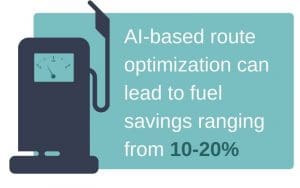
- Cost Savings: AI algorithms, combined with real-time data, enable logistics companies to identify the most efficient routes, leading to reduced fuel usage and lower operational costs. Studies have shown that businesses can achieve significant savings in fuel expenses by implementing AI-powered route optimization.
- Improved Efficiency: By optimizing routes and allocating resources effectively, AI-driven systems help streamline logistics operations. This improves delivery times, reduces idle time, and boosts productivity. With fewer delays and optimized schedules, companies can handle more deliveries each day, increasing operational efficiency.
- Enhanced Customer Satisfaction: Quicker routes and on-time deliveries lead to happier customers. AI-powered route planning ensures that deliveries are made within the promised time frames, improving customer satisfaction and retention. Satisfied customers are more likely to become repeat customers who recommend the logistics company to others.
- Reduced Carbon Footprint: Optimized routes result in less fuel usage and reduced emissions. By minimizing the distance traveled and eliminating unnecessary idling or detours, AI-driven route planning contributes to sustainability efforts and environmental conservation.
- Enhanced Decision-Making: AI in logistics provides valuable insights by analyzing large volumes of data. Logistics companies can use this information to make informed decisions, identify areas for improvement, and adapt their strategies accordingly. Predictive analytics also help in demand forecasting, allowing businesses to align their inventory levels with customer needs.
Driving Savings & Increasing Revenue: The Power of Optimization in Logistics
The optimization of route planning and transportation in logistics can yield substantial savings in fuel costs and workforce expenses while increasing revenue. Through the use of AI algorithms and predictive analytics, logistics companies can unlock significant cost-saving opportunities and enhance overall profitability.
- Fuel Cost Reduction: AI-driven route optimization is a powerful tool for logistics companies to reduce travel distances and idle time by considering factors like traffic congestion and road conditions. The result? Substantial fuel savings. This is especially important when you consider the significant impact of fuel costs on overall operational expenses. Research studies consistently demonstrate that implementing AI-based route optimization can lead to fuel savings ranging from 10% to 20%, depending on the specific logistics operations and routes involved.
- Workforce Efficiency: Traditional route planning and dispatch processes require a lot of manual effort and time. By using AI algorithms, logistics companies can automate these tasks and streamline the planning process. This reduces the time and manpower required for manual route planning freeing employees to focus on other value-added activities. With AI-powered optimization, logistics companies can efficiently assign resources, manage driver schedules, and cut down on overtime costs.
- Increased Delivery Capacity: AI-driven optimization allows logistics companies to maximize their delivery capacity without the need for extra resources. By identifying the most efficient routes, cutting down on empty miles, and optimizing vehicle usage, companies can handle more deliveries with the same fleet.
- Reduced Operational Costs: Efficient route planning and transportation optimization directly impact many operational costs. By reducing travel distances, logistics companies can reduce vehicle maintenance costs, prolong vehicle lifespan, and lower repair expenses. Optimized routes also reduce the risk of delays and associated penalties, mitigating potential financial losses.
- Enhanced Customer Satisfaction and Revenue: Efficient route planning ensures on-time deliveries, which directly impacts customer satisfaction and loyalty. Satisfied customers are more likely to continue doing business with a logistics company, potentially resulting in repeat orders and increased revenue. Reliable and timely deliveries improve the company’s reputation, drawing new customers and expanding market opportunities.
It’s worth noting that the benefits of optimization extend beyond immediate cost savings. The increased efficiency and accuracy achieved through AI-driven route planning and transportation optimization improve a company’s overall operational performance. Customers get better service, risks are reduced, resources are used for maximum benefit, and operations are streamlined.
Conclusion
The integration of AI-driven route planning and transportation optimization in logistics operations has many advantages like cost savings and increased revenue. By using AI algorithms and predictive analytics, logistics companies can streamline their operations, improve efficiency, and better serve customers.
The impact of AI-driven route planning and transportation optimization goes beyond immediate financial benefits. It improves operational performance, enhances resource allocation, reduces risks, and streamlines overall logistics operations. These improvements directly contribute to customer satisfaction, as reliable and timely deliveries foster positive customer experiences. Satisfied customers are more likely to recommend the logistics company to others, generating new business opportunities and expanding the customer base.
Ready to take your last-mile deliveries to the next level? Discover how Elite EXTRA’s automated systems can revolutionize your operations. Say goodbye to inefficient routes and hello to optimized ones that save time and money. With full operational visibility at your fingertips, you’ll make informed decisions that streamline your entire process. Delight your customers with faster fulfillment and real-time updates that keep them in the loop.
With 25+ years of industry experience, Elite EXTRA offers a comprehensive feature set that caters to all your needs. Integrate seamlessly, plan routes effortlessly, dispatch with ease, and keep your customers informed every step of the way. Their fully integrated last-mile ecosystem empowers your logistics operations like never before. Contact Elite EXTRA today for detailed information.
Sources
https://research.aimultiple.com/logistics-ai/
https://tms-outsource.com/blog/posts/benefits-of-ai-in-logistics-efficiency-accuracy-cost-savings/
https://nexocode.com/blog/posts/ai-in-logistics/





